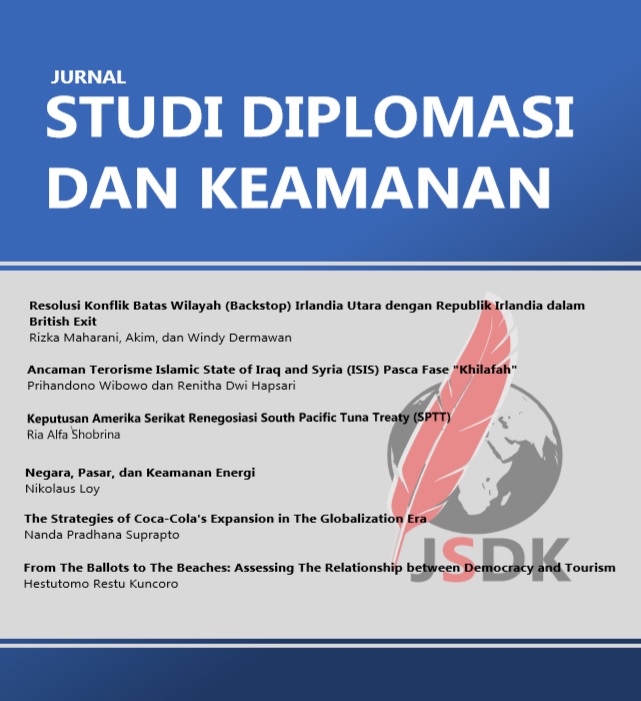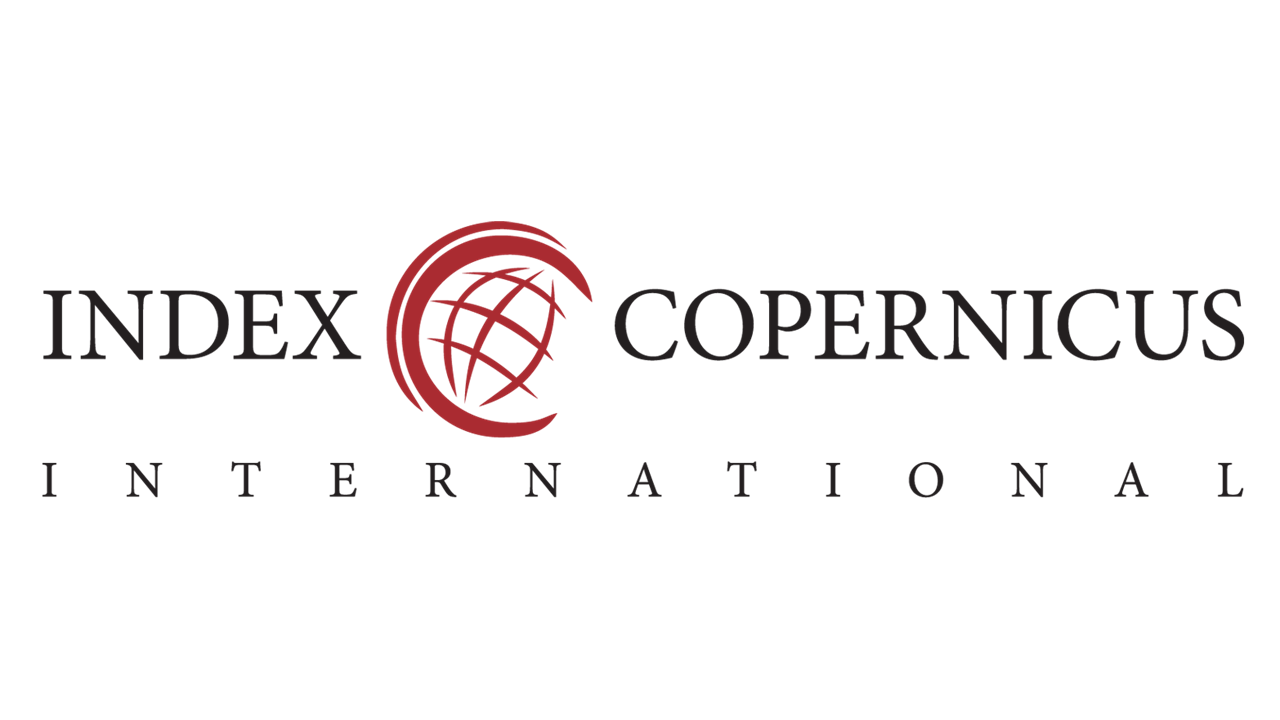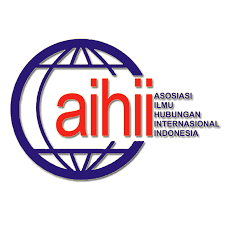FROM THE BALLOTS TO THE BEACHES: ASSESSING THE RELATIONSHIP BETWEEN DEMOCRACY AND TOURISM
DOI:
https://doi.org/10.31315/jsdk.v12i1.3220Abstract
Meskipun hubungan antara demokrasi dan stabilitas, serta antara stabilitas dan pariwisata, telah terjalin dengan baik, makalah-makalah ilmiah yang dengan kuat memeriksa hubungan antara demokrasi dan pariwisata sangat langka. Artikel ini berupaya mengatasi masalah ini dengan memeriksa korelasi antara tingkat demokrasi dan tingkat pengembangan pariwisata. Untuk itu, artikel ini mencoba menggunakan regresi berganda untuk melihat korelasi antara keduanya, dan interpretasi hasil dilakukan secara kualitatif menggunakan perbandingan studi kasus. Demokrasi sebagai variabel independen diwakili oleh Indeks Demokrasi Unit Intelijen Economist, sedangkan pengembangan pariwisata sebagai dependen diwakili oleh Travel and Tourism (T&T) Competitiveness Index, Forum Ekonomi Dunia (World Economic Forum). Dua regresi terpisah dijalankan. Yang pertama adalah regresi berganda dengan T&T Index sebagai variabel dependen dan Indeks Demokrasi sebagai variabel independen. Yang kedua adalah regresi multivariat dengan Indeks Demokrasi sebagai variabel independen, dan Indeks T&T dipecah menjadi empat belas komponen untuk melayani sebagai variabel dependen; regresi ini digunakan untuk menguji sifat sebenarnya dari hubungan tersebut. Regresi pertama menunjukkan korelasi kecil (r = 0,18) tetapi signifikan secara statistik (p <0,001) antara Indeks Demokrasi dan Indeks T&T. Regresi kedua menunjukkan bahwa Indeks Demokrasi memiliki korelasi yang signifikan secara statistik (semua p <0,001) dengan semua komponen Indeks T&T, dan sebagian besar korelasi positif kecuali untuk daya saing harga (r = - 0,237). Efek dari Indeks Demokrasi kecil pada sebagian besar variabel dependen kecuali untuk Keterbukaan Internasional (r = 0,401), Kesiapan ICT (r = 0,328), Sumber Daya Manusia dan Pasar Tenaga Kerja (0,315), dan Layanan Pariwisata dan Infrastruktur (0,395). Hasil ini menunjukkan bahwa ada hubungan positif yang kuat antara demokrasi dan pariwisata karena rezim demokratis cenderung memiliki karakteristik yang bermanfaat bagi pengembangan pariwisata. Hasilnya menuntut penelitian lebih lanjut yang lebih rumit untuk mengungkapkan sifat sebenarnya dari hubungan mereka.
Kata Kunci: Demokrasi, Pariwisata, Travel and Tourism Competitiveness Index.
References
Antonakakis, N., Dragouni, M., Eeckels, B., & Filis, G. (2016). Tourism and economic growth: Does democ-racy matter? Annals of Tourism Research, 61, 258–264. https://doi.org/10.1016/j.annals.2016.09.018
Beer, C. (2009). Democracy and Gender Equality. Studies in Comparative International Development, 44(3), 212–227. https://doi.org/10.1007/s12116-009-9043-2
Beljinac, N. (2012). Consociational democracy in post conflict societies. Politeia, 2(3), 199–208. https://doi.org/10.5937/pol1203199B
Blanke, J., & Chiesa, T. (2008). The Travel & TourismCompetitiveness Report 2008: Balancing Economic De-velopment and Environmental Sustainability. Retrieved from World Economic Forum website: https://www.ub.unibas.ch/digi/a125/sachdok/2014/BAU_1_6306075.pdf
Blanke, J., & Chiesa, T. (2009). The Travel & TourismCompetitiveness Report 2009: Managing in a Time of Turbulence. World Economic Forum.
Blanke, J., & Chiesa, T. (2011). The Travel & Tourism Competitiveness Report 2011. Retrieved October 30, 2019, from http://www3.weforum.org/docs/TTCR11/
Blanke, J., & Chiesa, T. (2013). The Travel & TourismCompetitiveness Report 2013: Reducing barriers to economic growth and job creation.
Buehler, A. G. (1968). The Cost of Democracy. The Annals of the American Academy of Political and Social Science, 379, 1–12. Retrieved from JSTOR.
Business Daily. (2018, September 9). Political stability boosts tourism in first half of the year. Retrieved Sep-tember 18, 2019, from Business Daily website: https://www.businessdailyafrica.com/news/Political-stability-boosts-tourism-in-first-half-of-the-year/539546-4750610-5w5v6n/index.html
Calderwood, L. U., & Soshkin, M. (2019). The Travel & Tourism Competitiveness Report 2019. Retrieved from https://www.weforum.org/reports/the-travel-tourism-competitiveness-report-2019/
Causevic, S., & Lynch, P. (2013). Political (In)stability and its Influence on Tourism Development. Tourism Management, 34, 145–157. https://doi.org/10.1016/j.tourman.2012.04.006
Chaykowski, R. P., & Powell, L. M. (1999). Women and the Labour Market: Recent Trends and Policy Issues. Canadian Public Policy / Analyse de Politiques, 25, S1–S25. https://doi.org/10.2307/3552314
Chik, A. (2011). Political Stability: Country Image for Tourism Industry in Bangladesh.
Crotti, R., & Misrahi, T. (2015). The Travel & Tourism Competitiveness Report 2015. Retrieved from World Economic Forum website: http://www3.weforum.org/docs/TT15/WEF_Global_Travel&Tourism_Report_2015.pdf
Crottie, R., & Misrahi, T. (2017). The Travel & Tourism Competitiveness Report 2017: Paving the way for a more sustainable and inclusive future. Retrieved from World Economic Forum website: http://www.sela.org/media/2756841/the-travel-and-tourism-compettiveness-report-2017.pdf
Demirbolat, A. (2012). The Structural Relationships Between Democracy and Education at the Macro Level. In The Relationship Between Democracy and Education (pp. 20–26).
EIU. (2019). Democracy Index 2018: Me too? Retrieved from The Economist Intelligence Unit website: https://www.eiu.com/public/topical_report.aspx?campaignid=Democracy2018
European Foundation for the Improvement of Living and Working Conditions. (2016). The Gender Em-ployment Gap: Challenges and Solutions. 106.
Feng, Y. (1997). Democracy, Political Stability and Economic Growth. British Journal of Political Science, 27(3), 391–418. Retrieved from JSTOR.
Ijere, T. C. (2015). Democracy and Violent Conflict: A Reflection on the Crisis in Nigeria. Developing Country Studies, 5(18), 29-34–34.
Issa, I. A., & Altinay, L. (2006). Impacts of Political Instability on Tourism Planning and Development: The Case of Lebanon. Tourism Economics, 12(3), 361–381. https://doi.org/10.5367/000000006778493664
Kelly, S., Truong, M., Earp, M., Reed, L., & Shahbaz, A. (2015). Freedom on the Net 2015. Retrieved from https://freedomhouse.org/report/freedom-net/freedom-net-2015
Kelly, S., Truong, M., Shahbaz, A., Earp, M., & White, J. (2017). Freedom on the Net 2017. Retrieved from Freedom House website: https://freedomhouse.org/sites/default/files/FOTN_2017_Full_Report.pdf
Kumar, A. M. (2017). Democracy and Political Stability: A Comparative Study of Estonia and India, 1991-2015 | M. | International Research Journal of Multidisciplinary Studies. Retrieved September 18, 2019, from http://irjms.in/sites/irjms/index.php/files/article/view/449
Lai, S. (2019, February 23). Countries with the cheapest internet in the world – ranked | Atlas & Boots. Re-trieved September 27, 2019, from https://www.atlasandboots.com/remote-jobs/countries-with-the-cheapest-internet-world/
Li, X. (2019). Research on tourism industrial cluster and information platform based on Internet of things technology: International Journal of Distributed Sensor Networks. https://doi.org/10.1177/1550147719858840
MacDonald, R., & Ricci, L. A. (2001). PPP and the Balassa Samuelson Effect: The Role of the Distribution Sector (SSRN Scholarly Paper No. ID 268969). Retrieved from Social Science Research Network website: https://papers.ssrn.com/abstract=268969
Michalon, M. (2017). Tourism(s) and the way to democracy in Myanmar. Asian Journal of Tourism Re-search, 2(1). https://doi.org/10.12982/AJTR.2017.0007
Neumayer, E. (2004). The Impact of Political Violence on Tourism: Dynamic Cross-National Estimation. The Journal of Conflict Resolution, 48(2), 259–281. Retrieved from JSTOR.
Nova, E. G. (2018, October 18). Cuba: Internet access is expensive and limited—LatinAmerican Post. Re-trieved September 27, 2019, from https://latinamericanpost.com/23985-cuba-internet-access-is-expensive-and-limited
Pearson, K. (1992). On the Criterion that a Given System of Deviations from the Probable in the Case of a Correlated System of Variables is Such that it Can be Reasonably Supposed to have Arisen from Random Sampling. In S. Kotz & N. L. Johnson (Eds.), Breakthroughs in Statistics: Methodology and Distribution (pp. 11–28). https://doi.org/10.1007/978-1-4612-4380-9_2
Persson, T., & Tabellini, G. (2009). Democratic capital: The nexus of political and economic change. Ameri-can Economic Journal: Macroeconomics, 1, 88–126.
Pulido-Fernández, J. I., & Rodríguez-Díaz, B. (2016). Reinterpreting the World Economic Forum’s global tourism competitiveness index. Tourism Management Perspectives, 20, 131–140. https://doi.org/10.1016/j.tmp.2016.08.001
Quinn, D. P., & Woolley, J. T. (2001). Democracy and National Economic Performance: The Preference for Stability. American Journal of Political Science, 45(3), 634–657. https://doi.org/10.2307/2669243
Ramdhani, D. A., Supriadi, D., & Barokatuminalloh, B. (2017). Analysis of Determinants the Foreign Ex-change Earnings of Tourism Sector in Indonesia. Jurnal Akuntansi Manajemen Dan Ekonomi, 19(1), 34–43.
Shambaugh, J., Nunn, R., & Portman, B. (2017). Lessons from the Rise of Women’s Labor Force Participa-tion in Japan. 11.
Verick, S. (2018). Female labor force participation and development. IZA World of Labor. https://doi.org/10.15185/izawol.87
Webster, C., & Ivanov, S. (2016). Political ideologies as shapers of future tourism development. Journal of Tourism Futures. https://doi.org/10.1108/JTF-05-2015-0029
Weinstein, A. (2018, January 31). When More Women Join the Workforce, Wages Rise—Including for Men. Harvard Business Review. Retrieved from https://hbr.org/2018/01/when-more-women-join-the-workforce-wages-rise-including-for-men
Downloads
Published
Issue
Section
License
1. Copyright of this journal is possession of Editorial Board and Journal Manager, by the knowledge of the author, whilst the moral right of the publication belongs to the author.
2. The legal formal aspect of journal publication accessibility refers to Creative Commons Atribusi-Non Commercial-No Derivative (CC BY-NC-SA), implies that publication can be used for non-commercial purposes in its original form.
3. Every publication (printed/electronic) are open access for educational purposes, research, and library. Other than the aims mentioned above, editorial board is not responsible for copyright violation











